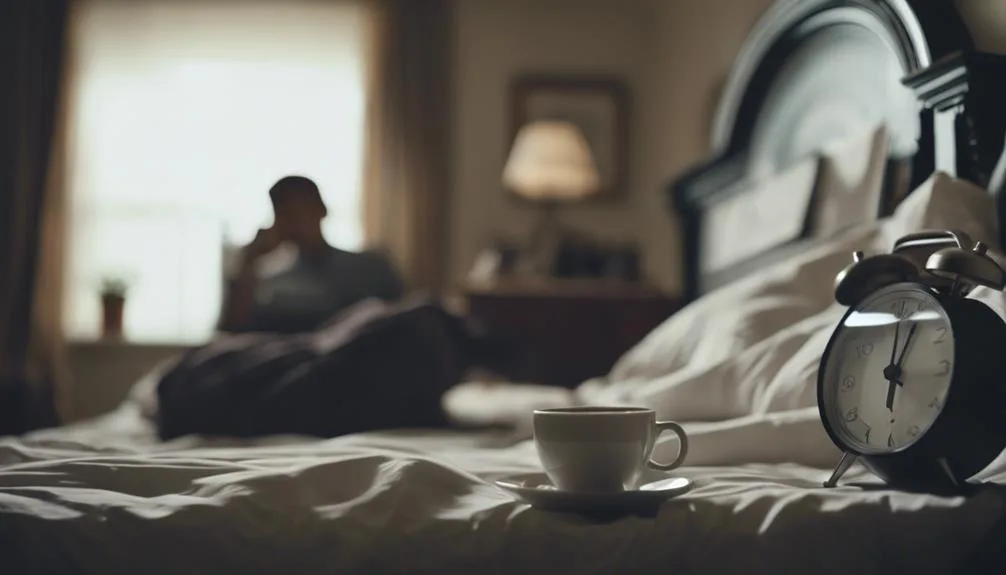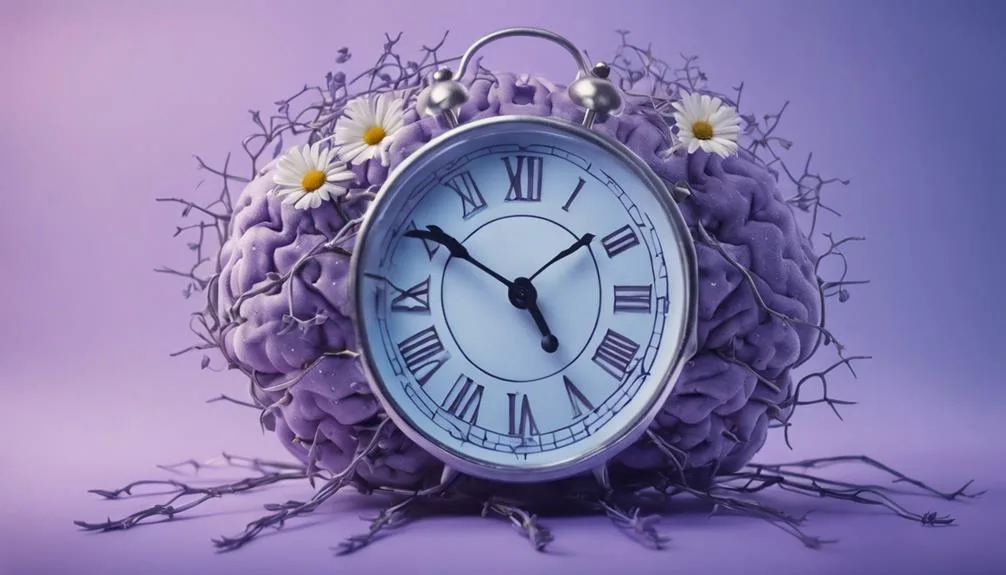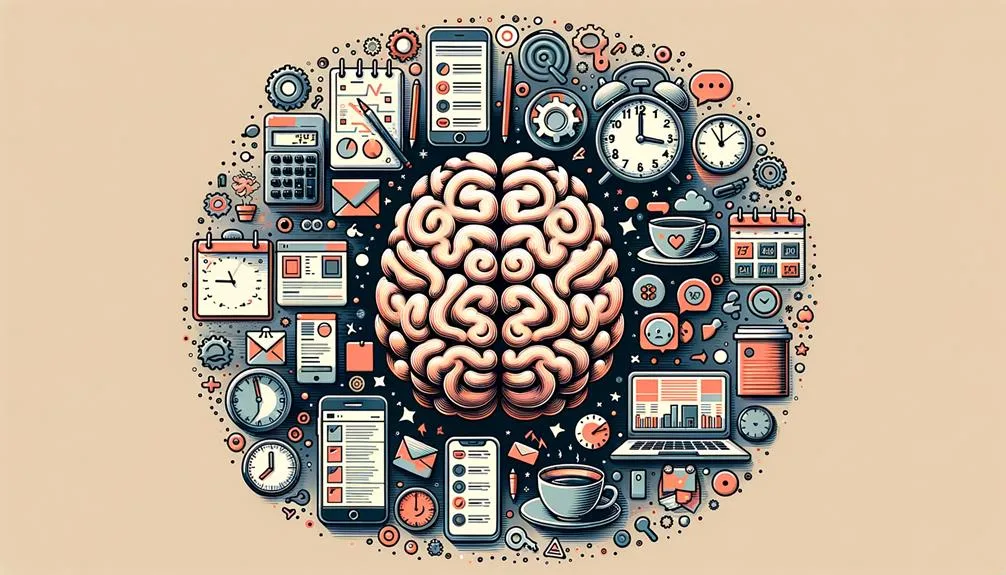In the quest for mental equilibrium, the role of lifestyle choices and habitual behaviors in exacerbating anxiety cannot be overstated. The pervasive nature of anxiety, coupled with its capacity to diminish quality of life, underscores the necessity of identifying and mitigating its aggravators.
From the stimulatory effects of caffeine that disrupt our inner calm to the deceptive allure of alcohol as a stress reliever, the pathways through which these factors intensify anxiety symptoms are complex and multifaceted. Furthermore, the intertwining of sleep disturbances and dietary habits with anxiety levels invites a closer examination.
By unraveling these connections, we pave the way for a deeper comprehension of anxiety's dynamics, setting the stage for informed interventions.
Key Takeaways
- Reduce or eliminate caffeine to prevent worsened anxiety and muscle tension.
- Monitor alcohol intake, as it can deplete serotonin and exacerbate anxiety.
- Prioritize sleep, aiming for 7-9 hours to lessen vulnerability to anxiety.
- Opt for a balanced diet, avoiding sugar spikes that mimic panic attacks.
Caffeine's Anxiety Effects
Stimulating the central nervous system, caffeine can significantly exacerbate anxiety symptoms by increasing heart and breathing rates, and triggering the body's fight or flight response. This reaction is not just immediate.
Over time, habitual caffeine consumption can lead to dependency, and the subsequent withdrawal effects, such as headaches, irritability, and fatigue, can serve as potent anxiety triggers themselves. The cycle of consumption and withdrawal creates a fluctuating baseline of alertness and mood, destabilizing an individual's emotional equilibrium.
For those prone to anxiety, this instability can heighten their sensitivity to anxiety triggers, magnifying both the frequency and intensity of anxiety episodes. Understanding this dynamic is crucial for managing anxiety effectively, suggesting a need for careful monitoring and possible reduction of caffeine intake.
Alcohol and Anxiety Connection
While alcohol may offer temporary relief from anxiety, its aftereffects can significantly worsen symptoms, leading to a complex relationship between consumption and mental health.
The immediate sense of relaxation alcohol provides is misleading, as its consumption precipitates a drop in serotonin levels, a critical neurotransmitter associated with mood regulation. This decrease can exacerbate anxiety symptoms, making it a counterproductive coping mechanism.
Furthermore, habitual drinking can deplete serotonin reserves over time, heightening anxiety triggers and rendering individuals more susceptible to anxiety disorders. The cyclic nature of alcohol's impact on anxiety underscores the importance of recognizing and addressing the underlying issues rather than seeking solace in temporary fixes that ultimately aggravate the condition.
The Sleep-Anxiety Cycle

The intricate relationship between sleep deprivation and heightened anxiety forms a challenging cycle that impacts an individual's mental health and overall well-being. Poor sleep hygiene exacerbates stress, leading to increased anxiety, which in turn disrupts sleep patterns further.
Implementing stress management strategies is essential for breaking this cycle. Evidence supports the effectiveness of relaxation techniques and mindfulness practice in improving sleep quality and reducing anxiety levels. These practices not only aid in calming the mind before bedtime but also enhance the ability to manage stressors that can interfere with sleep.
Dietary Impacts on Anxiety
Dietary choices play a significant role in the management and exacerbation of anxiety symptoms, with certain foods and substances potentially triggering or alleviating these feelings. Sugar's influence on anxiety is particularly notable, as rapid spikes and crashes in blood sugar levels can mimic or worsen anxiety symptoms. Nutritional strategies that focus on a balanced diet can significantly mitigate these effects.
- Limiting sugar intake can prevent the rapid fluctuations in mood and energy levels associated with anxiety.
- Incorporating complex carbohydrates like whole grains can stabilize blood sugar.
- Including magnesium-rich foods such as leafy greens may reduce anxiety symptoms.
Adopting these nutritional strategies can be a powerful tool in managing anxiety, offering a natural and sustainable approach to improving mental health.
Managing Anxiety Thoughts

Addressing the management of anxiety-inducing thoughts is a critical step toward achieving mental equilibrium and reducing the overall impact of anxiety on daily life. Implementing mindfulness practice and relaxation techniques provides a foundation for individuals to observe their thoughts without judgment, facilitating a sense of calm and presentness. Cognitive restructuring, a cornerstone of stress management, involves identifying and challenging irrational or harmful thought patterns, replacing them with more balanced and realistic perspectives. This analytical approach, combined with empathetic understanding, offers a structured pathway for individuals seeking to navigate the complexities of anxiety thought management.
| Strategy | Description | Benefits |
|---|---|---|
| Mindfulness | Focusing on the present moment without judgment. | Reduces rumination and stress. |
| Relaxation | Techniques such as deep breathing and progressive relaxation. | Lowers physical symptoms of anxiety. |
| Cognitive Therapy | Identifying and restructuring negative thoughts. | Promotes rational thinking patterns. |
| Stress Management | Developing coping mechanisms for stressors. | Enhances overall well-being. |
| Acceptance | Acknowledging thoughts without trying to change them. | Decreases avoidant behaviors. |
Reducing Caffeine Intake
Building on the understanding of anxiety thought management, reducing caffeine intake emerges as a crucial strategy for mitigating physical symptoms that exacerbate mental distress. Caffeine, a central nervous system stimulant, can amplify the body's stress response, leading to increased anxiety levels. Mindful consumption of caffeine and considering caffeine alternatives can significantly enhance one's ability to manage anxiety more effectively.
- Caffeine Alternatives: Herbal teas offer a comforting substitute, providing a calming effect without the jitteriness.
- Mindful Consumption: Paying attention to how much and when you consume caffeine can help maintain balanced energy levels.
- Energy Levels: Observing how caffeine affects your energy and anxiety can guide more informed choices, emphasizing stability over temporary boosts.
Alcohol Consumption Considerations

Evaluating the relationship between alcohol consumption and anxiety requires a nuanced understanding of how temporary relief can transform into long-term challenges.
In social settings, alcohol often serves as a social lubricant, easing interactions and diminishing immediate feelings of anxiety. However, this temporary ease can obscure the underlying emotional triggers that contribute to anxiety, delaying essential coping and resolution strategies.
Furthermore, the aftermath of alcohol consumption, characterized by a drop in serotonin levels, can exacerbate anxiety symptoms, making them more pronounced and harder to manage over time.
It is vital for individuals to critically assess how alcohol affects their anxiety in both short and long-term contexts, recognizing that what may seem like a relief can, in fact, be an aggravator of anxiety symptoms.
Establishing a Nighttime Routine
Establishing a nighttime routine can significantly mitigate anxiety by fostering a sense of calm and predictability before sleep. An effective nighttime routine incorporates elements designed to reduce stress and prepare the body and mind for rest. This approach aligns with the principles of sleep hygiene, which emphasize practices conducive to maintaining health through quality sleep.
Key components of a beneficial nighttime routine include:
- Engaging in stress relieving activities or relaxation techniques, such as meditation, deep breathing exercises, or gentle yoga.
- Adhering to consistent bedtime rituals that signal the brain it's time to wind down.
- Creating an environment conducive to sleep, including minimizing exposure to screens and ensuring the bedroom is dark, quiet, and cool.
These practices, rooted in evidence-based research, underscore the importance of a structured pre-sleep routine in enhancing overall well-being and managing anxiety.
Frequently Asked Questions
How Does Physical Exercise Influence Anxiety Levels, and What Types of Activities Are Most Beneficial?
Physical exercise notably reduces anxiety levels through consistent engagement and the release of endorphins. Activities like yoga and running, combined with proper hydration, offer the most benefits, promoting mental well-being and stress reduction.
Can Certain Medications Exacerbate Anxiety Symptoms, and How Should One Address This With Their Healthcare Provider?
Certain medications can exacerbate anxiety symptoms, highlighting the importance of consultation with healthcare providers. Discussing medication alternatives and closely monitoring effects are crucial steps in managing and mitigating the impact on one's mental well-being.
How Do Social Interactions and Relationships Impact Anxiety, and What Strategies Can Help Manage Social Anxiety?
Navigating social interactions and relationships impacts anxiety like a boat navigating choppy waters. Online friendships and varied communication styles can both alleviate and exacerbate anxiety, necessitating strategies rooted in empathy and evidence to effectively manage social anxiety.
To What Extent Does the Environment or Workplace Stress Contribute to Anxiety, and What Practical Steps Can Be Taken to Mitigate These Effects?
Environmental and workplace stress significantly contribute to anxiety, exacerbating symptoms. Practical steps include optimizing dietary habits and sleep patterns, fostering resilience against stress-induced anxiety and promoting mental well-being through evidence-based, empathetic strategies tailored to individual needs.
Are There Any Specific Vitamins or Supplements Known to Help Reduce Anxiety Symptoms, and What Is the Scientific Evidence Supporting Their Use?
"Prevention is better than cure," especially when addressing anxiety through dietary habits and sleep patterns. Research indicates vitamins like magnesium and Omega-3 supplements, supported by scientific evidence, can alleviate anxiety symptoms effectively.
Conclusion
In conclusion, the journey towards alleviating anxiety resembles navigating through a forest dense with fog—where caffeine, alcohol, disrupted sleep, dietary choices, and unmanaged thoughts serve as the thickest mists. By cautiously adjusting one's path to avoid these exacerbators, the fog begins to clear, revealing a landscape of tranquility and improved mental well-being.
This allegorical expedition underscores the importance of awareness and modification of certain lifestyle elements, emphasizing a holistic approach towards conquering the pervasive challenge of anxiety. Through empirical evidence and empathetic understanding, the path to a clearer mind and a calmer existence becomes attainable, guiding individuals out of the shadows of anxiety and into the light of psychological resilience and health.

